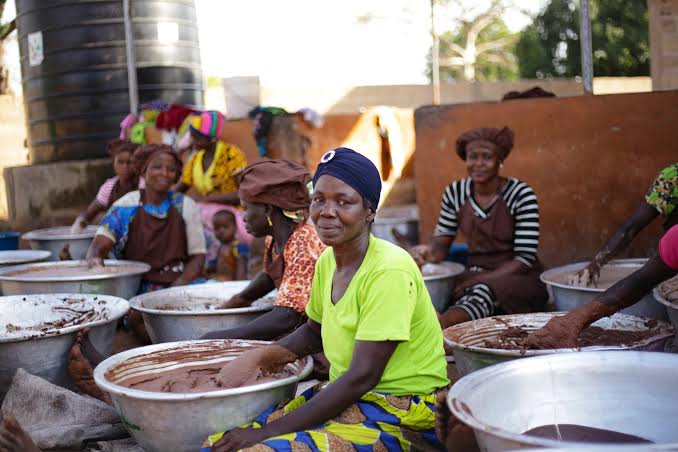In Ghana, shea butter, locally known as Kpakahili (Eng. trans. raw cream) in Dagbani, nkuto (Akan) or nku (Ga), is either used as a food product or applied as lotion to protect the skin during the dry Harmattan season. The current northern regional capital Tamale derives its name from a combination of the words "tama" and "yili", meaning "the town of Shea fruits".
Shea butter is occasionally substituted for cocoa butter in recipes, however the flavor is obviously different.. The English word "shea" comes from sǐ, the tree's name in Bambara. It is known by many local names, such as kpakahili in the Dagbani language, taama in the Wali language, nkuto in Twi, kaɗe or kaɗanya in Hausa, òkwùmá in the Igbo language, òrí in the Yoruba language, karité in the Wolof language of Senegal, and ori in some parts of West Africa and many others.

SOME OF ITS USES
Shea butter is mainly used in the cosmetics industry for skin- and hair-related products (lip gloss, lip stick, skin moisturizer creams and emulsions, and hair conditioners for dry and brittle hair).It is also used by soap makers and massage oil manufacturers, typically in small amounts, because it has plenty of unsaponifiables, and higher amounts result in a softer soap that has less cleaning ability. It is an excellent emollient for dry skin. No evidence shows it is a cure, but it alleviates the pain associated with tightness and itching.
In some African countries such as Benin, Shea Butter is used for cooking oil, as a waterproofing wax, for hairdressing, for candle-making, and as an ingredient in medicinal ointments. It is used by makers of traditional African percussion instruments to increase the durability of wood (such as carved djembe shells), dried calabash gourds, and leather tuning straps.
In Nigeria, Shea butter is used for the management of sinusitis and relief of nasal congestion. It is massaged into joints and other parts of the body where pain occurs.

Shea butter is no doubt one of the various blessings Just imagine the commercial side of exporting this product to other parts of the world and bring back such proceeds to expand the Shea tree plantations in Africa? Someone might want to think about that. Here at Power of Africa we connect you with the opportunities in Africa for the benefit of humanity and the development of Africa.
Africa is indeed a blessing to the world in more ways than we can count.
credits: Petra Udeh/ToluRock
